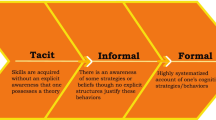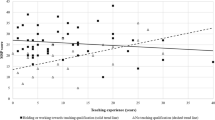Abstract
This paper reports on degrees of awareness and use of specific metacognitive strategies by 16 students in a final-year high school biology class in New Zealand. The aims of the intervention were to broaden students' thinking about bioethical issues associated with cancer and to enhance students' use of metacognition. Cues and prompts were used in this unit of work to help students use metacognitive strategies since students did not generally use metacognitive strategies spontaneously. Scaffolding was mediated through the teacher modelling, questioning, cueing or prompting students to evaluate their learning. The research reported here illustrates how teachers can cue students to be more self-directed in their learning. Three case studies illustrate how learning strategies were used differentially. Most students were aware of strategies that could help them to learn more effectively. It was found that those students who were not only aware of but also used strategies to plan, monitor and evaluate their work, produced essays of higher quality.
Similar content being viewed by others
References
Baird, J. (1986). Improving learning through enhanced metacognition: A classroom study. European Journal of Science Education, 8, 263–282.
Baird, J. (1992). The individual student. In J. Baird & J. Northfield (Eds.), Learning from the PEEL experience (pp. 37–60). Melbourne, Australia: Monash University.
Baird, J. (1998). A view of quality in teaching. In B. Fraser & K. Tobin (Eds.), International handbook of science education (Vol. 1, pp. 153–167). Dordrecht, The Netherlands: Kluwer.
Beyer, B. (1997). Improving student thinking: A comprehensive approach. Needham Heights, MA: Allyn & Bacon.
Boekaerts, M. (1997). Self-regulated learning: A new concept embraced by researchers, policy makers, educators, teachers and students. Learning and Instruction, 7(2), 161–186.
Borkowski, J. G., Carr, M., Rellinger, E., & Pressley, M. (1990). Self-regulated cognition: Interdependence of metacognition, attributions and self-esteem. In B. F. Jones & L. Idol (Eds.), Dimensions of thinking and cognitive instruction (pp. 53–92). Hillsdale, NJ: Lawrence Erlbaum.
Conner, L. (2000a). Teaching social and ethical issues in senior high school science. Christchurch College of Education Journal of Educational Research, 5, 23–44.
Derry, S. (1990). Learning strategies for acquiring useful knowledge. In B. F. Jones & L. Idol (Eds.), Dimensions of thinking and cognitive instruction (pp. 374–379) Hillsdale, NJ: Lawrence Erlbaum.
Flavell, J. H. (1976). Metacognitive aspects of problem solving. In L. B. Resnick (Ed.), The nature of intelligence (pp. 231–235). Hillsdale, NJ: Lawrence Erlbaum.
Guba, E. G., & Lincoln, Y. S. (1989). Fourth generation evaluation. Newbury Park, CA: SAGE.
Gunstone, R. F. (1994). The importance of specific science content in the enhancement of metacognition. In P. J. Fensham, R. F. Gunstone, & R. T. White (Eds.), The content of science: A constructivist approach to its learning and teaching (pp. 131–146). London: Falmer Press.
Hacker, D. (1998). Definitions and empirical foundations. In D. J. Hacker, J. Dunlowsky, & A. C. Graesser (Eds.), Metacognition in educational theory and practice (pp. 1–23). Mahwah, NJ: Lawrence Erlbaum.
Hand, B. M., Alvermann, D. E., Gee, J., Guzzetti, B. J., Norris, S. P., Phillips, L. M., et al. (2003). Message from the “Island Group”: What is literacy in science literacy? Journal of Research in Science Education, 40(7), 607–615.
Hand, B. M., Prain, V., & Yore, L. D. (2001). Sequential writing tasks' influence on science learning. In P. Tynjala, L. Mason, & K. Lonka (Eds.), Writing as a learning tool: Integrating theory and practice (pp. 105–129). Dordrecht, The Netherlands: Kluwer.
Keys, C. (2000). Investigating the thinking processes of eighth grade writers during the composition of a scientific laboratory report. Journal of Research in Science Teaching, 37(7), 676–690.
Loughran, J., & Derry, N. (1997). Researching teaching for understanding: The students' perspective. International Journal of Science Education, 19(8), 925–938.
Merriam, S. B. (1988). Case study research in education: A qualitative approach. San Francisco: Jossey-Bass.
Ministry of Education. (1994). Biology in the New Zealand curriculum. Wellington, New Zealand: Learning Media.
National Research Council. (1999). How people learn: Brain, mind, experience and school. Washington, DC: National Academy Press.
Paris, S. G., Lipson, M. T., & Wixson, K. K. (1983). Becoming a strategic reader. Contemporary Educational Psychology, 8, 293–316.
Paris, S. G., & Winograd, P. (1990). How metacognition can promote academic learning and instruction. In B. F. Jones & L. Idol (Eds.), Dimensions of thinking and cognitive instruction (pp. 15–51). Hillsdale, NJ: Lawrence Erlbaum.
Shuell, T. (1988). The role of the student in learning from instruction. Contemporary Educational Psychology, 13, 276–295.
Siegler, R. S. (1990). How content knowledge, strategies and individual differences interact to produce strategy choices. In W. Schneider & F. E. Weinert (Eds.), Interactions among aptitudes, strategies, and knowledge in cognitive performance (pp. 73 –89). New York: Springer.
Stipek, D. J., & Weisz, J. R. (1981). Perceived personal control and academic achievement. Review of Educational Research, 51(1), 101–137.
Thomas, G. P. (1999). Student restraints to reform: Conceptual change issues in enhancing students' learning processes. Research in Science Education, 29(1), 89–109.
Thomas, G. P., & McRobbie, C. J. (2001). Using a metaphor for learning to improve students' metacognition in the chemistry classroom. Journal of Research in Science Teaching, 38(2), 222–259.
Wang, M. C., & Peverly, S. T. (1986). The self- instructive process in classroom learning contexts. Contemporary Educational Psychology, 11, 370–404.
White, R. T. (1998). Decisions and problems in research on metacognition. In B. J. Fraser & K. G. Tobin (Eds.), International handbook of science education (pp. 1207–1212). Dordrecht, The Netherlands: Kluwer.
White, R., & Gunstone, R. (1989). Metalearning and conceptual change. International Journal of Science Education, 11, 577–586.
Winne, P. (1996). A metacognitive view of individual differences in self-regulated learning. Learning and Individual Differences, 8(4), 327–353.
Author information
Authors and Affiliations
Corresponding author
Rights and permissions
About this article
Cite this article
Conner, L.N. Cueing Metacognition to Improve Researching and Essay Writing in a Final Year High School Biology Class. Res Sci Educ 37, 1–16 (2007). https://doi.org/10.1007/s11165-004-3952-x
Published:
Issue Date:
DOI: https://doi.org/10.1007/s11165-004-3952-x




